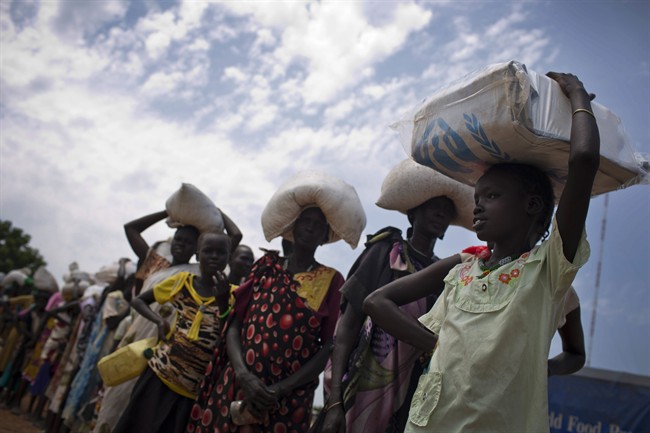The United Nations needs $4.4 billion by the end of March to prevent catastrophic hunger and famine in South Sudan, Nigeria, Somalia and Yemen, yet just $90 million has been collected so far, Secretary-General Antonio Guterres said Wednesday.

READ MORE: South Sudan government, UN declare famine due to prolonged civil war
With over 20 million people at risk of starvation over the next six months and famine already declared in parts of South Sudan, “we are facing a tragedy,” Guterres said.
“We must avoid it becoming a catastrophe.”
Convening reporters for a briefing at the U.N. headquarters, Guterres amplified concerns that U.N. officials and humanitarian groups have expressed in recent weeks about the lack of food in the four nations. While they differ in many ways, their plights all are connected by a thread of violent conflict, Guterres noted. Drought is also a factor, particularly in Somalia.
READ MORE: 1.4 million children face ‘imminent death’ due to famine: UN
Children’s agency UNICEF warned Tuesday that almost 1.4 million children are at “imminent risk of death” from acute malnutrition this year in the four countries. A day earlier, U.N. agencies and South Sudan’s government said more than 100,000 were experiencing famine in two counties in South Sudan, a nation where tens of thousands of people have died in a civil war that began in December 2013 and severe inflation has put food beyond the financial reach of many.
U.N. and food organizations define famine as when more than 30 per cent of children under age 5 suffer from acute malnutrition and mortality rates are two or more deaths per 10,000 people every day, among other criteria.
Beyond the counties experiencing famine now, “millions of people are barely surviving in the space between malnutrition and death,” Guterres said.
In Nigeria, a seven-year uprising by the Islamic extremist group Boko Haram has killed more than 20,000 people and driven 2.6 million from their homes. A U.N. humanitarian co-ordinator last month said malnutrition in the nation’s northeast is so pronounced that some adults are too weak to walk and some communities have lost all their toddlers.
READ MORE: Over 120,000 Nigerians face famine due to Boko Haram: UN
Somalia, which faced famine in 2010-2011, is experiencing widespread drought and has endured years of conflict and attacks by Islamic militants of the al-Shabab group. But the country is taking steps toward having its first fully functioning central government in a quarter-century. Newly elected President Mohamed Abdullahi Mohamed was inaugurated Wednesday.
In Yemen, the Arab world’s poorest nation, over 7 million people need emergency food aid, yet funding shortages have forced the World Food Program to cut rations in Yemen by more than half since last year, Guterres said.
Altogether, the U.N. says humanitarian operations in the four countries will cost more than $5.6 billion this year. Despite the funding shortfall so far, Guterres said he believes governments and other donors “will step up.”
“In our world of plenty, there is no excuse for inaction or indifference,” he said, adding that “there is no time to lose.”



Comments